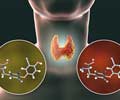Highlights
- A study conducted in Netherlands looks at the association between thyroid hormone levels and sudden cardiac death.
- 261 sudden cardiac deaths were analyzed.
- Thyroid hormone level was found to increase the risk of sudden cardiac death by 2.5 times.
- The risk levels remained high even after controlling for other risk factors for cardiac death like high blood pressure (hypertension) and high cholesterol.
Thyroid Hormone
The thyroid hormone is secreted by the thyroid gland that is present at the base of the throat and it is important for the proper functioning of every organ system in the body including the heart and the brain. When the thyroid hormone makes very little hormone, it is called hypothyroidism.Effects of the Thyroid Hormone on the Heart
The thyroid hormone is known to exert an influence on the functioning of the heart by
- Affecting the force and the rate at which the heart pumps blood.
- Cholesterol level
- Blood pressure
Hypothyroidism and the Heart
Hypothyroidism is a condition in which there is lower production of the thyroid hormone. It can lead to the following effects on the heart- Lowered heart rate
- The artery walls become less elastic
- Increase in blood pressure
- A build up of cholesterol
Hyperthyroidism is a condition in which there is excess secretion of thyroid hormone in the blood. This condition is very rare and is found to affect only 1% of the population.
- The heart beat is faster
- May lead to abnormal heart rhythms
- Can lead to atrial fibrillation
- Palpitations
Rotterdam Study
Study that Links Thyroid Hormone and Cardiac Death
Dr Layal Chaker and colleagues studied 10,318 patients who were part of the Rotterdam Study. The death certificates and medical records of patients who died due to sudden cardiac death were analyzed and the level of free thyroxine thyroid hormone levels and the thyroid stimulating hormone in the blood samples.Results of the Study
The researchers found that 261 study participants died of sudden cardiac death, stressing the prevalence of this condition.
- It was found that free thyroxine hormone levels in the blood that was at the higher end of the normal range was 2.5 times more likely to lead to sudden cardiac death than levels of the hormone at the lower end of the normal range.
- Higher levels of free thyroxine hormone lead to 4 times increase in 10 year risk for sudden cardiac death when compared to low levels of the hormone.
- The high risk for sudden cardiac death due to high thyroxine hormone remained the same even after controlling for other factors like high blood pressure and high cholesterol.
- Hereditary Factors: The condition could run in the family with people who are first relatives with an affected individual at a higher risk for the disease.
- Age is another important factor, as the age advances, the risk of thyroid problem also increases.
- Gender: It has been found that women are far more likely to be affected by a thyroid problem than men.
- Medical Conditions: There are certain medical conditions which can trigger a thyroid hormone problem like type 1 diabetes, pernicious anemia and Addison’s disease.
The study provides a connection between elevated thyroid hormone levels and sudden cardiac death but the researchers highlight that further research may be required to understand if other factors were involved. The thyroid hormone levels were tested at a particular point in the study and this level could have increased or decreased after the testing.
Sudden cardiac deaths display very few symptoms prior to the event and this study offers an insight into a possible mechanism that could lead to it, providing scope for better treatment.
References:
- Hypothyroidism and Heart Disease - (http://www.hormone.org/questions-and-answers/2013/hypothyroidism-and-heart-disease)
- Thyroid Disease and Heart - (http://circ.ahajournals.org/content/116/15/1725)
- Thyroid Hormone: How it affects your heart? - (http://www.health.harvard.edu/heart-health/thyroid-hormone-how-it-affects-your-heart)















